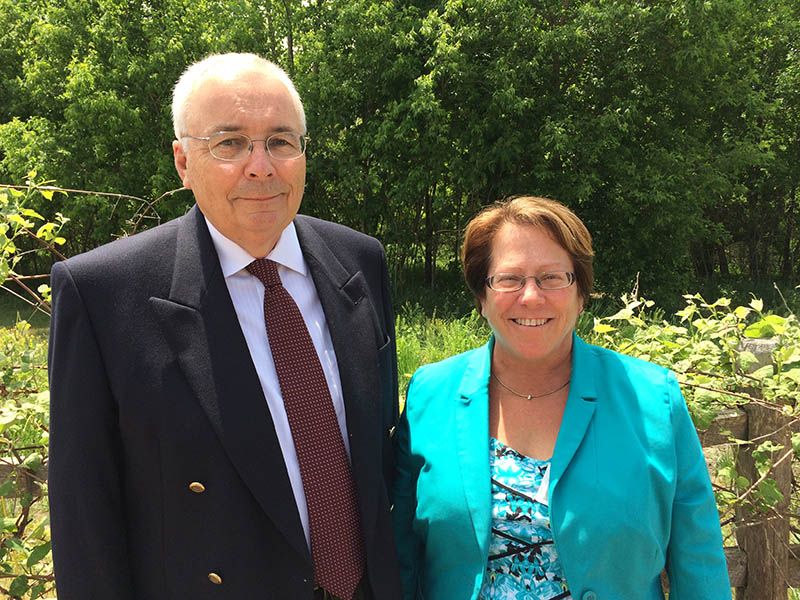“I’ve been blessed.”
That’s how Linda Morrow, CEO of the Glengarry Memorial Hospital, sums up the past 37 years. Morrow announced in late January that she will be retiring from the hospital’s chief post in June.
Originally from Montreal, she met her husband when she was nursing at Lakeshore General Hospital. He was a dairy farmer, so the 21-year-young city girl moved to a new home in Maxville.
“Coming from the city I thought ‘this is going to be boring’. It’s been anything but.”
Her choice to apply for a nursing position at the Glengarry Hospital would become the start of a nearly 40-year career, during which she also raised three children with her husband.
“In a small hospital you wear a lot of hats and so you have a lot opportunity to learn.”
And that’s exactly what she did.
After nursing for a number of years, she then became head ER nurse, taking on more responsibility, and eventually Chief Nursing Officer.
When she became interested in the broader operations of the hospital, she started sitting on a number of committees, gradually building her knowledge of finances and governance.
Looking back after 17 years in senior management, and 20 years of frontline nursing, she says she never saw herself in the top job, but when the opportunity opened up, she simply took a chance.
“I never had an aspiration to be a CEO. That was never one of my goals.”
Once there though, it can be a lonely place at times. “When you have to make decisions, they’re [often] not popular decisions.”
That can involve tough budgetary choices. However, she says HGMH has been fortunate to actually “end up in the black” every year financially. “But every year gets harder.”
Regionalization
Sustainability often leads to a discussion of survivability and Morrow spends a lot of time defending the smaller, rural hospitals.
Yet she is also keen to maintain a dialogue on how to creatively address the looming healthcare needs that an aging population will bring to Ontario.
She thinks some of the answers lie in regionalization, using the analogy of a big box store versus the small “mom and pop” shop.
“Regionalization isn’t always a bad thing. But you have to be careful that you don’t strip all of the services away because you don’t have the volume. We don’t need more people living in the city either and we don’t need more patients going to those hospitals that are already over-capacity.”
So it becomes a question of how best to utilize those hospitals that do have some room.
“I think we need to be senior-focused, rehab-focused, primary care-focused – doing the things we do, very well. “
Much to be proud of
Morrow says the hospital, with 37 beds and a 12-bed-capacity ER, has made a great deal of progress.
Key improvements during her tenure include the expansion of the Emergency and Ambulatory Care units and new ultrasound and diagnostic services.
Her crown jewel is the implementation of the Post-Acute Stroke Rehabilitation Program.
Most recently, the hospital recruited two new physicians who house their practices at the hospital and in turn, contribute to the on-call rotation. An active search is ongoing for a third.
But for all of these successes, Morrow reflectively credits her team.
“I’m going to miss them. They’re a great team. We [also] have a great Foundation who has been raising money and a good community that supports the hospital well.”
Big Shoes to Fill
Jacqueline Fraser is the past chair of the board of directors and has worked closely with Morrow for the past 13 years.
“She has always impressed me with her deep knowledge of the healthcare system and her keen ability to keep on top of all the new developments despite her busy schedule.”
She also speaks of her strength of character, particularly in difficult times – but also of her compassion.
“She’s a strong lady but deep down she really cares very much for her employees, for her patients and for the entire group of people that works with her.”
Work is underway to begin the search process for a new CEO. It’s a unique challenge because leaders wear multiple hats in a rural hospital, and there are fewer resources as support.
But as Morrow says, the opportunity is endless and whoever takes over the reigns will have a healthy bank account and a great team as support.
“We would definitely have loved to have kept her but she’s earned her retirement. She’ll be very deeply missed. She has served the hospital very efficiently, dutifully and loyally,” said Fraser.
When June rolls around, Morrow knows she will have a significant change of pace ahead of her. But her main goal is to have more time for family – especially with two very young grandchildren and a new sailboat to enjoy.
But until June, there still is plenty of work to be done and Linda Morrow is keen – and grateful – to do it.


